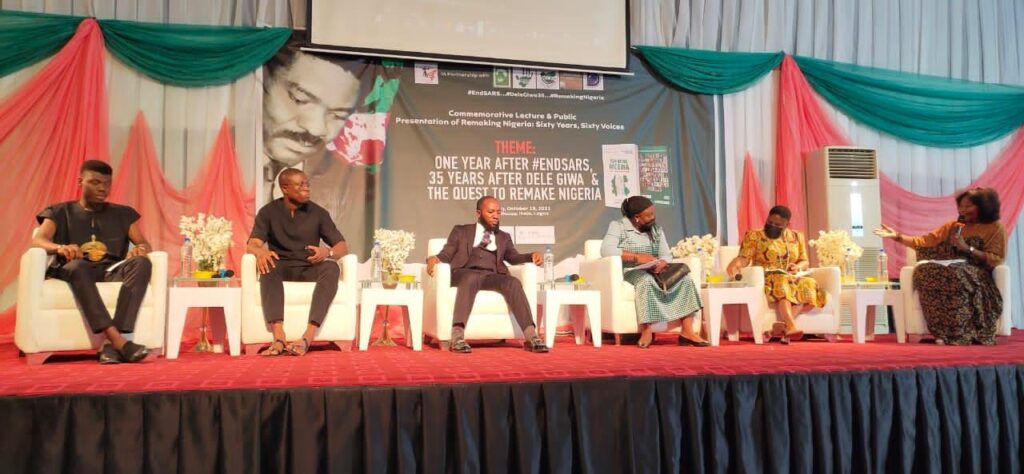Human rights activists have lamented the continued suppression of freedom of expression and the media in the country despite having a democratic government.
They spoke on Tuesday at the Commemorative Lecture and Public Presentation of Remaking Nigeria: 60 Years 60 Voices organised by the Africa Center for Media and Information Literacy (AFRICMIL) in partnership with Wole Soyinka Centre For Investigative Journalism, (WSCIJ), Enough is Enough Nigeria, PLAY!YA Nigeria, Media and Information Literacy and Intercultural Dialogue and supported by OSIWA and Ford Foundation.
The theme of the programme was ONE YEAR AFTER #ENDSARS 35 YEARS AFTER DELE GIWA & THE QUEST TO REMAKE NIGERIA.
Speakers at the programme included Senior Advocate of Nigeria, Mr Femi Falana, Executive Director of the International Press Centre, Lanre Arogundade, Founder, Media Law Centre, Richard Akinola and Director of Women Advocates Research and Documentation Center (WARDC), Dr Abiola Akiyode Afolabi who were all active citizens, journalists and activists at the time of the death of the renowned journalist Dele Giwa.
Coordinator of AFRICMIL, Chido Onumah in his welcome address noted that Nigeria has a history of attacks on the media and the attacks have been extended to the citizens who use social media as a form of expression.
While lamenting the muzzling of the media and expression of the citizens by the federal government, Onumah disclosed the plan by his organisation to produce a book of essays on the assassination of Dele Giwa to be published on his birthday.
The book will have 35 journalists write a thousand-word essay on different topics of interest within the scope of the place of courage in journalism, how to push back against the attack on media and journalism as well as the shrinking media space in Nigeria.
READ ALSO: Two journalists awarded 2021 Nobel Peace Prize
“It will serve as an opportunity for young journalists to explore and discuss new issues and challenges facing the media and journalists in Nigeria and enable them to reflect on the diminishing civic space in Nigeria and what journalists and citizens need to do to assert their rights. ”
The keynote speaker, Falana said the assassination of Dele Giwa marked the beginning of the bombing of Nigerians by the government as many other journalists were murdered, harassed, detained and imprisoned by past Nigerian governments.
While clarifying many issues on the Lekki Massacre and the nationwide #Endsars Movement, he stated that 99 people were killed between 20th to 24th October 2020 during the crisis and three dead bodies were confirmed by pathologist Prof John Obafunwa to have been traced to the Lekki Toll Gate Massacre. 20 dead bodies who were allegedly brought to mortuaries from Ikoyi Prison tagged unknown was also linked to the Lekki Massacre by the human rights lawyer.

He urged Nigerians not to allow the threat by the Police to deprive them of their freedom to peacefully demonstrate.
“The only thing that can constitutionally prevent peaceful demonstration is when there is a state of emergency being declared in the state. And it is not in the jurisdiction of the Police force, but the executive governor of a state that the authorisation of rallies, protests and demonstrations can come from. The police’s constitutional duty is to mobilise personnel to protect the citizens in their activity.
Akinnola, Journalist and Author, who has written many books including “Murder of Dele Giwa: The Answered Question” recounted his experience in the hands of the government when he was detained for many days in the Ikoyi Prisons.
He stressed the need to publish another report about executive lawlessness which had previously been perpetrated during the military reign saying that even under “this supposed democratic rule there are many more cases of disobedience for court orders.”
Akinnola called for more programmes and forums to keep the memory of the past alive and enlighten the next generation.
Lawyer and civil rights activist, Dr Akiyode-Afolabi also spoke on the need for Nigerians to stand up to the task of nation-building.
Arogundade who had also been victimised by past governments corrected the notion that youths have never been at the helms of affairs in Nigeria, stating the need for a change of political narrative and the need for the youth to move into the political space.
The Chairman of the event, Professor Pat Utomi also stressed the need to convert the youths to community organizers who are capable of organizing, programs, forums and events to make the change we need in the country.


